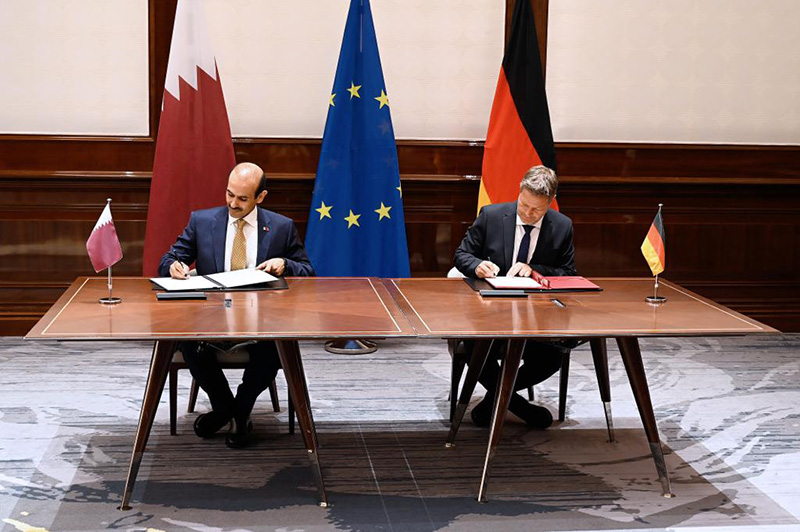Qatar and Germany have agreed to boost cooperation in LNG and hydrogen, as the latter looks to reduce reliance on pipeline gas supplies from Russia.
State-owned LNG giant QatarEnergy said in a statement that Qatar and Germany penned the joint declaration of intent on Friday.
German Minister for Economic Affairs and Climate Action, Robert Habeck, and Qatar’s energy minister and chief executive of QatarEnergy, Saad Sherida Al-Kaabi, signed the deal in Berlin.
“The agreement builds on the ongoing successful dialogue between the two countries and is expected to develop into a mutually beneficial energy partnership between Qatar and Germany through building LNG trade relations as well as pursuing the climate action ambitions of both countries,” it said.
QatarEnergy said this partnership would further strengthen Germany’s energy supply diversification through LNG imports from Qatar, while also facilitating bilateral cooperation in hydrogen and renewable sources.
Qatar to ship US LNG to Germany?
To remind, Habeck visited Doha in March and met with Al-Kaabi. QatarEnergy said in a statement after the meeting that the two sides agreed to work on a long-term LNG supply deal.
In the meantime, Germany’s Uniper has started work on the country’s first LNG import facility and chartered two FSRUs from Dynagas, while RWE took on charter two units from Hoegh LNG.
Germany is looking to start LNG imports as soon as possible and has also approved a law which enables a rapid expansion of the country’s LNG import infrastructure.
According to Germany’s Handelsblatt, Al-Kaabi said during the visit to Germany that Qatar could start delivering LNG to Germany from the Golden Pass LNG plant in 2024, prior to launch of its giant expansion project in Ras Laffan in 2025/2026.
State-owned LNG giant QatarEnergy owns a 70 percent stake in the $10 billion Golden Pass LNG export terminal while US energy firm ExxonMobil has a 30 percent share.
Once complete, the giant facility, located next to the existing LNG import terminal in Sabine Pass, will have three trains and a total liquefaction capacity of about 16 mtpa.
As per the expansion project in Qatar, QatarEnergy announced a final investment decision on its $28.75 billion North Field East project in February last year.
Under the project, QatarEnergy will build four mega trains with a capacity of 8 million tonnes per year in the Ras Laffan complex.
This first phase of the expansion project will increase Qatar’s LNG production capacity from 77 to 110 mtpa while the second phase will further boost capacity to total 126 mtpa.
The company’s unit Qatargas already operates in total fourteen LNG trains at Ras Laffan.

